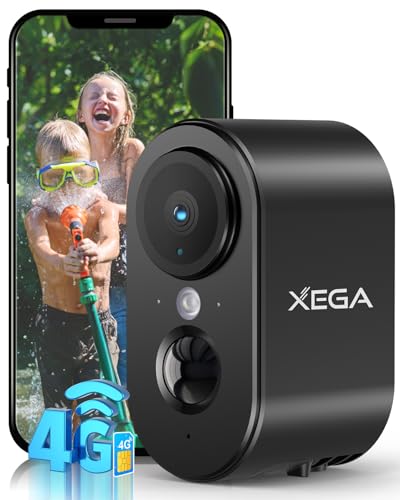


Security cameras have become an essential part of modern surveillance systems, providing homeowners and businesses with peace of mind and added security. However, one crucial aspect that is often overlooked is the internet speed required to ensure optimal performance of these cameras.
Many factors come into play when determining the internet speed needed for security cameras, including the number of cameras, resolution, frame rate, and whether the cameras are for live streaming or recording.
It is important to understand the bandwidth requirements of your security cameras to avoid lags in video streaming, poor image quality, or even complete loss of footage.
Understanding Internet Speed for Security Cameras
When it comes to security cameras, internet speed plays a crucial role in ensuring smooth and uninterrupted video streaming. The amount of internet speed required for security cameras depends on various factors such as the resolution of the camera, the number of cameras connected, and the type of footage being recorded.
Factors to Consider:
Resolution: Higher resolution cameras require more internet speed to transmit high-quality video footage. For example, a 4K camera will need more bandwidth compared to a 1080p camera.
Number of Cameras: The more cameras you have connected to your network, the more internet speed will be required to support simultaneous video streams from each camera.
Video Quality: If you are recording high-definition video or using features like motion detection, your security camera system will need more bandwidth to handle the data transfer efficiently.
It is recommended to have a minimum internet speed of 2-4 Mbps per camera for standard definition video and at least 10 Mbps per camera for high-definition video. However, these are just general guidelines, and the actual internet speed required may vary based on the specific setup and usage of your security camera system.
Importance of Internet Speed
Internet speed is a crucial factor when it comes to security cameras. The speed of your internet connection directly affects the quality of video streaming, the responsiveness of your security system, and the overall performance of your cameras.
1. Video Quality:
A higher internet speed allows for better video quality. A fast internet connection ensures that your security cameras can stream high-definition footage without buffering or lagging, providing you with clear and detailed images of any suspicious activity.
2. Real-Time Monitoring:
With a fast internet connection, you can monitor your security cameras in real-time. This means you can immediately respond to any potential security threats or incidents as they happen, improving the effectiveness of your security system.
| Internet Speed | Recommended Use |
|---|---|
| 1-2 Mbps | Basic video streaming |
| 2-4 Mbps | Standard video quality |
| 4-10 Mbps | High-definition video streaming |
Factors Affecting Internet Speed
When it comes to security cameras, several factors can impact the internet speed required for optimal performance:
Resolution
The higher the resolution of the camera, the more data it will need to transmit, leading to higher internet speed requirements. High-definition cameras (such as 4K) will require more bandwidth compared to standard-definition cameras.
Number of Cameras
The more cameras you have connected to the network, the more bandwidth will be consumed. Each camera will be sending data to the recording device or cloud storage, so the total number of cameras in your system will affect the internet speed required.
Compression
Some cameras support compression techniques to reduce the size of the video files before transmitting them over the network. This can help lower the internet speed requirements, but may also impact the quality of the footage.
Other factors like frame rate, motion detection sensitivity, and continuous recording can also impact the internet speed needed for security cameras. It’s important to consider these factors when planning your surveillance system to ensure smooth and reliable operation.
Recommended Internet Speed for Security Cameras
When it comes to security cameras, the recommended internet speed can vary depending on the type of camera and the resolution at which it operates. Generally, for a standard security camera that streams in 1080p resolution, a minimum internet speed of 2 Mbps is recommended for smooth live streaming and video playback.
For higher resolution cameras, such as 4K cameras, a faster internet connection is required. A minimum internet speed of 5 Mbps is recommended for 4K cameras to ensure high-quality video streaming without buffering or lag.
It’s important to note that these are just general recommendations and actual internet speed requirements may vary based on the specific camera model, the number of cameras connected to the network, and other factors like motion detection, cloud storage, and remote access.
Testing Internet Speed for Security Cameras
When setting up security cameras, it’s crucial to test your internet speed to ensure smooth and reliable performance. Here are some steps to help you determine if your internet speed is sufficient for your security cameras:
1. Check Your Current Internet Speed
Start by using an online speed test tool to check your current internet speed. This will give you a baseline to compare against the recommended speed for security cameras.
2. Determine the Required Speed
Security cameras typically require varying internet speeds depending on factors like resolution, frame rate, and number of cameras. Check the specifications of your cameras to determine the minimum recommended internet speed.
- For standard definition cameras, a minimum speed of 1-2 Mbps per camera is usually sufficient.
- For high-definition cameras, aim for a speed of at least 2-4 Mbps per camera.
- If you have multiple cameras or plan to stream video to a remote location, you may need higher speeds.
By testing and ensuring that your internet speed meets the requirements of your security cameras, you can avoid issues like lagging video feeds or dropped connections.
Improving Internet Speed for Security Cameras
Having a reliable internet connection is crucial for the effective operation of security cameras. Slow internet speeds can lead to lagging video feeds, poor image quality, and delayed notifications. To ensure optimal performance of your security cameras, consider the following tips to improve your internet speed:
Upgrade Your Internet Plan
Check with your internet service provider to see if you can upgrade to a faster internet plan. Higher bandwidth allows for smoother video streaming and better overall performance of your security cameras.
Position Your Router Strategically
Place your router in a central location away from obstructions to ensure a strong and stable connection to your security cameras. Avoid placing the router near electronic devices or thick walls that can interfere with the signal.
By implementing these strategies, you can enhance the internet speed for your security cameras and ensure reliable surveillance coverage for your property.







